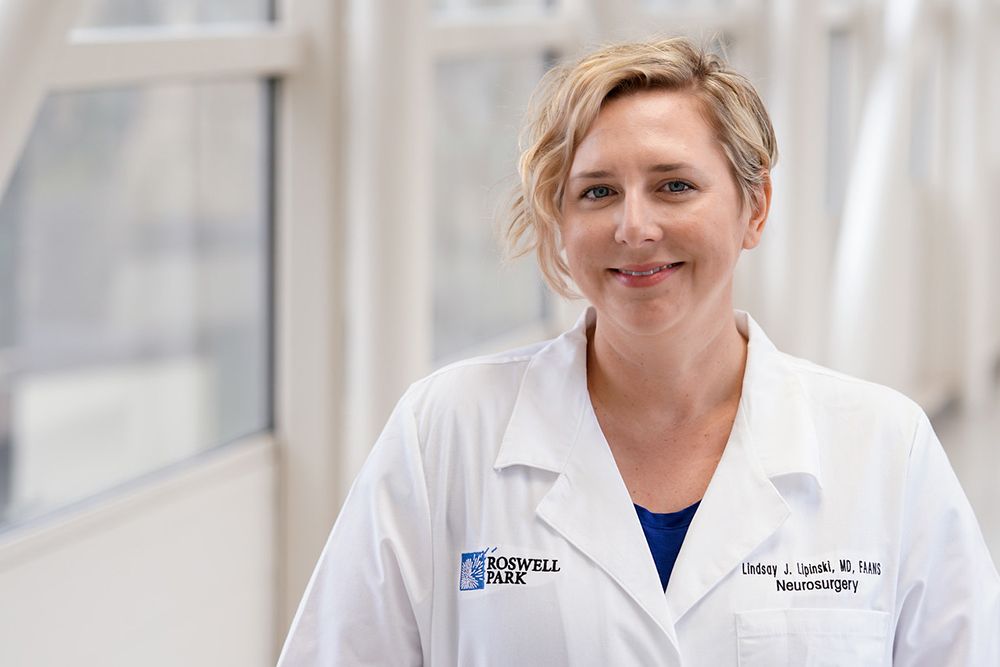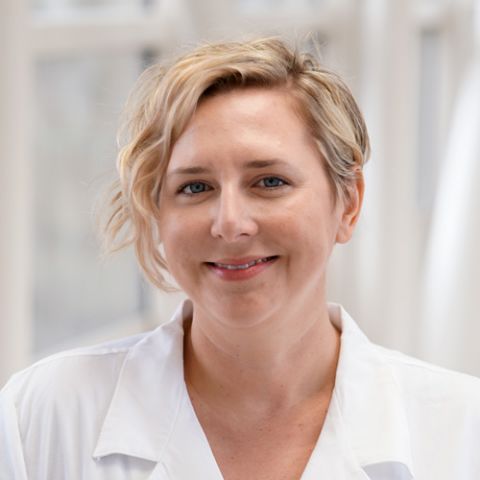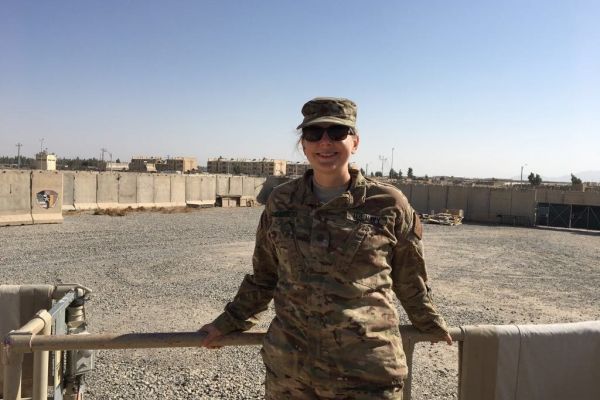What to learn about the surgeon’s experience and more before deciding where to seek care.
You may feel helpless if you're diagnosed with a brain tumor, but you don't have to be hopeless. With the right team of doctors, nurses and other specialists, you can receive skilled, effective treatment for your brain tumor and essential support to guide you through recovery. Many patients believe they must have surgery right away, but that's not usually necessary.
Learning all your options before you begin any treatment is crucial. Lindsay Lipinski, MD, FAANS, FACS, a neurosurgeon at Roswell Park Comprehensive Cancer Center, explains some key questions you should ask before determining where you or a loved one go for treatment.
Do I need a second opinion?
"The single most important factor in determining your prognosis is the success of your very first treatment. You have only one chance at a first treatment," says Dr. Lipinski.
It starts with getting an accurate diagnosis.
At Roswell Park, we have a highly experienced neuropathologist, Jingxin Qiu, MD, PhD, who is specially trained to diagnose tumors of the brain, spine and central nervous system. In addition to identifying and classifying a tumor, he can test for tumor markers that can help predict whether your tumor is likely to respond to chemotherapy or if you are eligible for other types of personalized treatments.
"I will always highly encourage patients to get a second opinion at a place that can focus on your exact diagnosis," says Dr. Lipinski. "Getting the right surgery or treatment can impact your survival down the line."
Even if you received your diagnosis in an emergency room or are currently admitted in another hospital, you have time for a second opinion. We can arrange for Roswell Park's brain tumor experts to review your imaging and set up a consultation with our neuro-oncology team.
How many surgeries do you perform?
"At Roswell Park, we treat tumors," states Dr. Lipinski. "Other places have neurologists or neurosurgeons working on aneurysms, degenerative spine conditions or trauma (injuries), but here we just focus on tumors."
Treating both benign (non-cancerous) and malignant (cancerous) tumors keeps Dr. Lipinski busy.
"I would say my time is split 50-50 between spine and cranial surgery, and I also perform Gamma Knife Radiosurgery, a targeted form of radiation for the brain that is done in conjunction with our expert radiation oncologist. I treat not only brain and spine tumors but also peripheral nerve tumors. Between Gamma Knife and open surgeries, I treat as many as many as 20-25 patients a month."
Why is it important to come to an NCI-designated cancer center?
When choosing where to receive treatment for a brain tumor, it's critical to come to an National Cancer Institute-designated cancer center.
"One advantage of coming to a place like Roswell Park is that all our experts discuss each case at our multidisciplinary tumor board. At these meetings, our team of neurosurgeons sits down with neurologists, medical oncologists, neuropathologists and neuroradiologists, and together, we create an optimal plan for each patient. You're an individual and your treatment should be unique to you."
Dr. Lipinski explains you may have access to more treatment options, including clinical trials, at an NCI-designated cancer center.
"Many patients could qualify for one of our clinical trials. We are currently running several studies here at Roswell Park for glioblastoma and metastatic brain cancer. We also have trials to determine the effectiveness of chemotherapy, photodynamic therapy, and optimizing the use of Gamma Knife radiosurgery before or after traditional surgery.
I don't have cancer. Why do I need to come to a cancer hospital?
"At Roswell Park, we are experts in 'tumors,' not just 'cancer,'" says Dr. Lipinski. "Anyone diagnosed with a brain tumor needs to receive the absolute best care and have an experienced team involved in making the right choices for them."
In fact, a good number of patients Dr. Lipinski sees do not have cancer.
"About 60% of the patients in the clinic come in with benign tumors, but like everything else, the treatment required depends on the diagnosis. Only a minority of those patients will need surgery, but many may be eligible to receive other forms of treatment.
"To some, we may recommend active surveillance, where we closely monitor the tumor over time to determine if it is growing or changing. If a tumor changes or grows, that may be a reason to proceed with treatment."
Will I need rehabilitation or other services?
"At Roswell Park, we're not just treating a tumor, we're treating a person. We will tailor a plan to your specific needs and diagnosis. Creating that plan with all of the specialists involved in your care is an in-person discussion. It's not a faxed note, it's not an email, it's a one-on-one conversation." Dr. Lipinski believes this personalized approach makes all the difference.
Why Roswell Park for brain tumors?
Looking for a second opinion? Find out what else makes Roswell Park unique in treating brain tumors.
Among the support offered to brain tumor patients include rehab services like occupational and physical therapy, palliative care, psychology and psychiatry, plus resources and programs in our 11 Day Power Play Resource Center, Spiritual Care and our Department of Social Work.
While every staff member is committed to helping you, Dr. Lipinski adds that one key member of the team is unique to Roswell Park patients.
"We have a knowledgeable and compassionate neuro-oncology nurse coordinator, Mary Rose Vater, who works personally with patients having surgery to go over their care plan. She is always available to handle patients' questions before and after their surgery. She helps to coordinate any other type of care they may need on their road to recovery and monitors their progress.
"Our entire staff is here to help you every step of the way."



